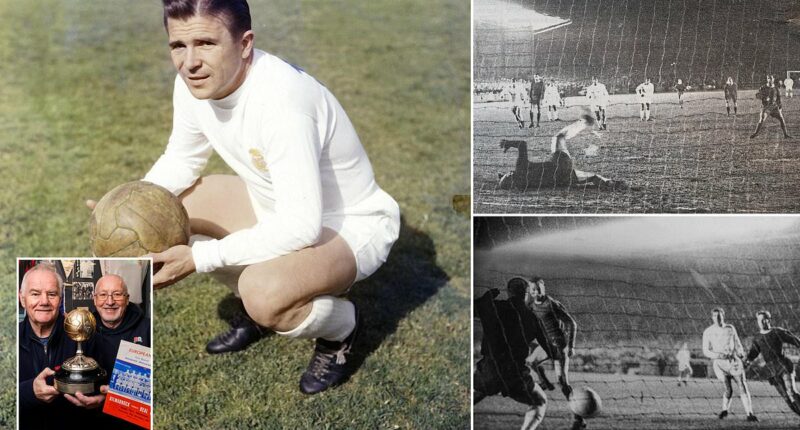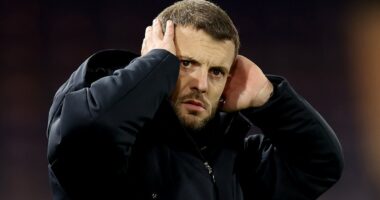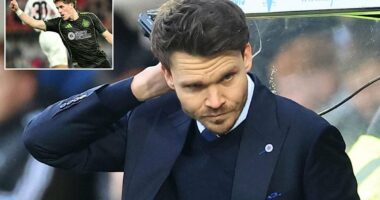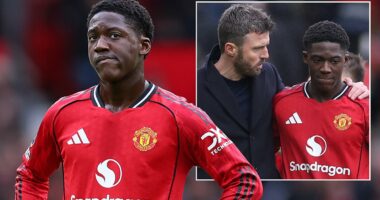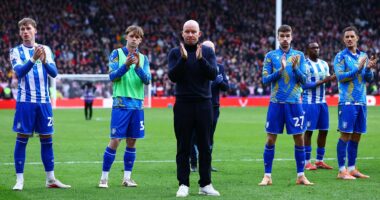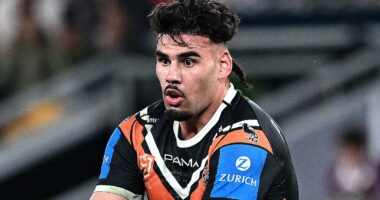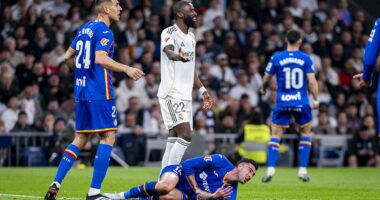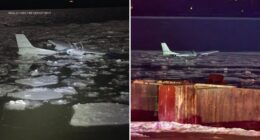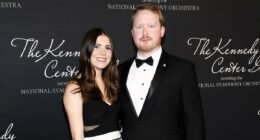Share this @internewscast.com
The bus door swung open, and a wave of greatness descended onto Rugby Park’s tarmac.
“You’d never usually show up early just to see a team bus arrive, but that night was different,” recounts Tom Brown. “There stood Paco Gento, Jose Santamaria, and the legendary Ferenc Puskas.”
Exactly sixty years ago, on November 17, 1965, Real Madrid came to face Kilmarnock in the European Cup’s opening round. In retrospect, it’s easy to label it a night of ‘Surreal Madrid.’ Kilmarnock took an early lead, ending the match in a 2-2 draw.
Yet, it all began at Rugby Park on a crisp November evening.
“I was there with my dad,” Brown fondly recalls. “He wouldn’t typically go to watch a bus arrive, but this was Real Madrid. He stood behind me as I gazed in awe at those stars making their way from the bus to the stadium.”

Kilmarnock fans still talk about the night Ferenc Puskas, above, and Real Madrid played at Rugby Park in the European Cup

The Rugby Park match marked the legendary Puskas’ last appearance in European competition for Real
“I remember it vividly. The players exuded sophistication and sported sun-kissed skin. Back then, before foreign holidays became common, a tan was something truly exotic.”
He had one mischievous observation, befitting a then 14-year-old. ‘I thought Puskas looked fat,’ he says. ‘But, once the game started, you realised he could still play.’
It was the magnificent Magyar’s last appearance in the European Cup. He missed the second leg and never played in European competition again for Real.
He left behind a substantial record of scoring 36 goals in 41 European Cup matches. He missed the 1959 final through injury but scored four goals in the final of 1960 at Hampden against Eintracht Frankfurt, and a hat trick when Real were beaten 5-3 by Benfica in the 1962 final.
He is remembered vividly for his cameo in Kilmarnock.
David McPhee, 73, says: ‘We thought we could win. We had won the league and been one of the two top clubs – with Rangers – in Scotland for about four or five years. We were confident and I was slightly disappointed at the end of the match when it was a draw.
‘It was wonderful when Real came out. Their white shorts were gleaming under the floodlights and they had these wee tight shorts in an era where they were usually baggy. They just looked like athletes, although Puskas had a wee pot belly.’
It remains a highlight for McPhee in six decades of supporting Killie. ‘We did win the domestic treble with me as a supporter,’ he says. ‘Though it did take some time.’ He is referring to winning the league in 1965, the Scottish Cup in 1997 and the League Cup in 2012.

Tommy McLean puts Kilmarnock in the lead from the penalty spot against Madrid in 1965

Jackie McInally scores the second goal for Kilmarnock in the 2-2 draw with Real Madrid
‘The funny thing looking back is that we thought we could do all this again,’ he says of the Real match. ‘We were a good side, Scottish champions, so why not play in the top European competition?’
Club historian John Livingston graciously opens the door to the Killie museum where remembrances of that night 60 years ago sit in a glass case.
There is the sculpture of what seems like Don Quixote presented to Kilmarnock by Madrid after the second leg. It sits beside a memorial trophy, topped by a miniature ball. A white shirt towers above the press cuttings. It was worn by Ramon Grosso, the Real No 9 in both legs.
Livingston, 72, has much to select from when choosing his best moment as a fan.
‘I was still in nappies at my first game,’ he says. ‘My mum was working and my dad could not get a babysitter so he took me on the supporters’ bus. It was April 1954, I was just more than a year old. The game was a B division match at Stenhousemuir and we won 1-0.’
He reflects on the more famous Real game. ‘I was in what they called The Middle where the older guys were. I went down the front and the great moments for me were looking at Gento. He was greased lightning. It was like something out of a film.
‘It’s one of the top three games for me. There are certain games you never forget. We beat Celtic 6-0 in Jimmy Johnstone’s first game. But the Eintracht game stands out for me.’
That was when Kilmarnock defeated Frankfurt 5-1 on September 22, 1964, in the Inter-Cities Fairs Cup. But that is another story…

David McPhee and club historian John Livingston recall Kilmarnock’s European Cup clash with Real Madrid back in 1965

The souvenir programme for Killie’s historic home clash with the Spanish superstars
There are those whose memories of November 1965 include meeting the Real team. There are others for whom the game has a lingering poignancy, forming a link to a beloved father.
Elsie Cook, the pioneer and driver of women’s football in Scotland, was just 19 when Real came to town. Her biography is called A Kiss Fae Pele as it recaptures encounters with the Brazilian just six months later. But, in November 1965, with typical bravado, she sneaked onto the Real bus after the match.
‘Me and a pal managed to get all the players’ autographs. They gave us lovely Real lapel badges. Pukas was my favourite because of the 1960 final and it was hard to believe that here he was, the Might Magyar, gracing us with his presence.’
Lesley Muir was not born at the time of the match but her link is forged in the unyielding substance of family bonds. Her father Brien McIlroy played in the home tie and scored in the second leg at Bernabeu.
She has the official invitation to the official post-match dinner in Madrid and the menu which offers croquetas, pizza, tortillas and sausage. The shirt Brien was given is in the Kilmarnock museum.
Lesley has powerful memories of a father who played such a heroic role with quiet grace.
‘He didn’t talk about playing a lot,’ she says. ‘My memory is of him talking about being at the Bernabeu and the kindness and warm welcome Real Madrid gave them. Also, they took the team into the dressing room where there were Real strips hanging up and they got to take their pick. Dad went straight for No9 as Alfredo Di Stefano had just left Real and that was his number.’ The number was inherited by Grosso.
Lesley was originally an Aberdeen fan, captivated by the Sir Alex Ferguson side of the early 1980s, but says: ‘I developed my passion for Killie later, when I understood more about dad’s career. He took me a few times, one where we met Elsie Cook outside the front door.

Real Madrid striker Ramon Grosso’s shirt takes pride of place in the Kilmarnock museum

Puskas presented a portlier figure at Rugby Park but his skills had not waned
‘Another fond memory was a visit to Motherwell, and having tea, in china cups and saucers, with Tommy McLean in his office when he was manager. I was shaking with nerves so much the cup was rattling.’
McLean, then boss at Fir Park, had been a winger for Kilmarnock. He was brought down at Rugby Park to earn and convert the penalty that gave Killie the lead against Real.
Lesley has so many memories of her father but one illustrates the immortality that is bestowed on heroes.
‘We were walking down John Finnie Street after a game and a man ran across the road to meet dad. Dad would have been about 50 at the time, but this man recognised him and just wanted to meet him, as dad was his boyhood hero. Dad was really taken aback, honoured and very humbled by the attention, I was really proud.’
Brien McIlroy passed away 30 years ago. Puskas died, aged 79, 41 years to the very day of the clash at Rugby Park, his 41st and last match in European competition.
They live on, of course. The collective memory is the harbour of eternal life.
